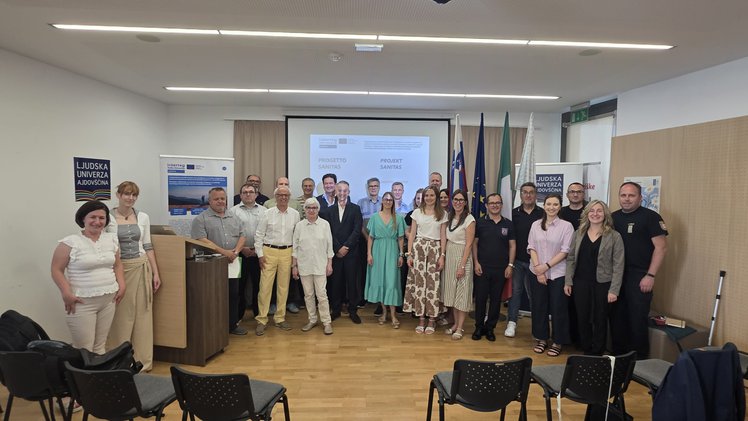The kick-off meeting for the SANITAS project has taken place in Ajdovščina

Training of healthcare personnel, drafting and signing of a cross-border healthcare protocol, purchase and testing of equipment—these are some of the main expected outcomes of the Interreg Italy-Slovenia SANITAS project, which officially kicked off with a launch meeting held on Thursday, June 19. The project partners and other key stakeholders from the cross-border area, active in healthcare, civil protection, and related sectors, gathered in the premises of the People’s University of Ajdovščina.
The project aims to strengthen institutional cooperation capacities between healthcare organizations and other key actors in the event of natural disasters caused by climate change. Specific objectives include the adoption of a cross-border protocol in the field of basic healthcare to harmonize emergency response measures in the area, improvement of equipment, upskilling of personnel, and strengthening collaboration between cross-border teams to increase access to basic healthcare for affected populations.
The meeting was introduced by Mitja Tripković, Deputy Mayor of the Municipality of Ajdovščina, who emphasized that climate change can be addressed by paying attention to the use of natural resources and by enhancing the professionalism of individuals. "Our Municipality dedicates most of its efforts to exactly this," he stated. Representing the Municipality of Gorizia and the EGTC GO, Roberta Chersevani highlighted both institutions’ commitment to cross-border cooperation, achieving concrete results, and being prepared for emergencies.
Janez Furlan, head of the Department for Economy and Development at the Municipality of Ajdovščina (the project lead partner), explained that the project idea stemmed from the experience of a cross-border protocol between fire brigades. In 2022, just days before wildfires broke out in the Karst area, units on both sides of the border had signed a cooperation agreement, which proved essential for effective intervention. "That’s when the idea arose to create a similar agreement and protocol for basic healthcare—to enable quick and efficient responses in serious natural or other types of emergencies," Furlan added.
He summarized the project’s key points as follows: "We want to reach a cooperation agreement between organizations on both sides of the border, strengthen the skills of our personnel (language, technical, and professional), and improve equipment for interventions in remote areas during major disasters." He also clarified what the project does not cover: "Our approach is not about first medical aid or civil protection rescue operations involving first responders, but rather focuses on basic healthcare assistance for people in affected areas who, due to chronic conditions, acute episodes, psychological issues, or trauma, cannot reach a doctor."
In addition to the lead partner—the Municipality of Ajdovščina—the project partners are Zdravstveni dom Nova Gorica (Nova Gorica Health Center), Javni zavod za gasilsko in reševalno dejavnost – Gasilska enota Nova Gorica (Public Institution for Fire and Rescue Services – Nova Gorica Fire Brigade), ASUGI – Giuliano Isontina University Health Authority, and EGTC GO.
Each partner presented their organization and the activities they will carry out as part of the project. Speakers included: Petra Kokoravec, Director of the Nova Gorica Health Center, Simon Vendramin, Fire Chief of Nova Gorica, Massimo Fioretti, Head of Emergency Services in Gorizia, and project managers from EGTC GO, Ezio Benedetti and Nika Durnik.
Planned actions include training for firefighters and obtaining licenses for transporting heavy trailers for use in natural disasters. The Gorizia emergency services will purchase portable equipment (e.g., ultrasound machines, ventilators) to assist vulnerable patients, and training sessions will be held on how to use this equipment. A final cross-border drill is also planned to test the measures defined in the cooperation protocol.
The meeting concluded with a project coordination session during which the partners agreed on initial activities and established guidelines for collaboration.
The SANITAS project is co-financed by the European Union under the Interreg VI-A Italy–Slovenia 2021–2027 Program.
The Interreg VI-A Italy–Slovenia 2021–2027 Program is a European cross-border cooperation program. By funding cooperation projects between Italian and Slovenian partners, the program enriches the cross-border territory through joint actions and investments aimed at improving the population’s quality of life, while also protecting and promoting the area’s cultural and natural heritage.
More information: www.ita-slo.eu
Related projects
-
SANITAS
EU Programme: Interreg Italy–Slovenia
Project Title: Cross-border cooperation for preparing joint action in the field of essential healthcare during natural disasters
Project Partners:
Lead Partner (LP): Municipality of Ajdovščina
Project ...
Read more
SANITAS
EU Programme: Interreg Italy–Slovenia Project Title: Cross-border cooperation for preparing joint action in the field of essential healthcare during natural disasters Project Partners: Lead Partner (LP): Municipality of Ajdovščina Project ...
Read more